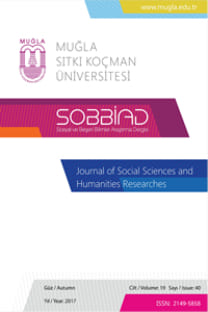Henry Rider Haggard’da Tinsel Sorgulama Evrensel Bağlanmışlık Kavramı
Tarihsel olarak Romantik Dönemin yazarlarından biri olmamasına rağmen Henry Rider Haggard’ın (1856-1925) eserlerindeki temel itkinin Romantik olduğu söylenebilir; çünkü özellikle geç dönem eserlerinde Haggard, tin ile maddenin uzlaşısını aramaktadır. Kendi toplumunun ezici materyal yaşam algısına tezat olarak doğal bir dünya algısını temsil ettiği bu eserleri, tinsel ve maddi bir dünyanın uzlaşısının arzulandığı bir kurgusallığı sunar. Bu sebeple, evrensellik düşüncesini oluşturmadan önce Haggard, geç Viktorya dönemi pek çok çağdaşı gibi kan dökülen sahneleri resmedip, batılı maceraperestin avcılık hikayelerini anlatarak yazarlık kariyerine başlar; ancak bu tutumu doğada mevcut mistik insanüstü gerçekliği farketmesiyle kariyerinin ileriki yıllarında değişir. Bu yüzden tüm hayvan ve insanların tinsel ortak bir boyutta kesiştiklerine inanır. Böylesi bir boyut hayvan ve insanların birbirleriyle iletişime geçebilmelerine imkan tanır. Bu nedenle, o gün için populer olan maceracı seyyahın farklı coğrafyalardaki av hikayelerini anlatmak yerine, hayvanların artık avlanmadığı aksine mistik roller üstlendikleri tinsel konulara vurgu yapan bir anlatımı, yazarlık kariyerinin ilerleyen dönemlerinde tercih ettiği görülmektedir. Bu makalenin amacı, Haggard’ın çevresindeki gerçeklik olgusuna karşı niçin pek çok çağdaşının aksine zamanla bir farklılaşma yaşadığını örnekleyerek; onun evrensellik düşüncesinin ne olduğunu göstermektir.
Anahtar Kelimeler:
Evren, Animizm, Tinselcilik, Bağdaşıklık
HENRY RIDER HAGGARD'S SPIRITUAL QUESTIONING AND THE CONCEPT OF COSMOLOGICAL INTERCONNECTEDNESS
Although Henry Rider Haggard (1856-1925) is chronologically not an author of a Romantic movement, the desire controlling his late fantasy can be said to be a Romantic one where he seeks for a unification of spirit and matter. His presentation of a spiritualized natural world in opposition to the materialism of his own culture can well be regarded as an attempt to fictionalize a desired reconciliation of the spiritual and material world. Before he settled his philosophy of universalism, he therefore started writing as a typical late Victorian author extolling the virtues of blood and representing the hunting adventures of western men in his narratives; but later he conceived a supernatural truth among all components of the nature. He, therefore, accepted a common spiritual dimension shared by animals and humans. Such a dimension provided the possibility of communication between animal and human. Therefore, late in his career he stopped writing about then very common hunting stories and instead he dealt with some other narratives featuring spiritual themes and stories where animals were no longer hunted but played some spiritual roles. This article by this regards clarifies the reasons why Haggard, opposing to several of his contemporaries, differed in his attitude towards the cosmic reality in his environment and how the idea of Haggardian cosmology works.
Keywords:
Cosmos, animism, spiritualism, interconnectedness,
___
- Bursey, W. (1972). “Rider Haggard: A Study in Popular Fiction”. Diss. Memorial University of Newfoundland.
- Coan, S. (2001). “Sir H. Rider Haggard and the Zulu War.” The Anglo-Zulu War Historical Society, Pietermaritzburg, December, 65-77
- Cohen, M. (1968). Rider Haggard: His Life and Works. London: Macmillan.
- Haggard, R. Henry.(2001). Diary of an African journey: the Return of Rider Haggard. New York: New York UP.
- Haggard, R. Henry.(1926). The Days of My Life: An Autobiography. London: Longmans, Green &Co. Vol. I&II.
- Haggard, R. Henry.(1991). The Mahatma and the Hare. London: Longmans.
- Haggard, R. Henry. (1989). King Solomon’s Mines. Oxford and New York: Oxford UP.
- Langwith, J. Mark. (2006). “‘A Far Green Country’: An Analysis of the Presentation of Nature in Works of Early Mythopoeic Fantasy Fiction.” Diss. University of St. Andrews.
- Manthorpe, V. (1996).Children of the Empire: The Victorian Haggards. London: Victor Gollancz.
- Monsman, G. (2006). H. Rider Haggard on the Imperial Frontier: The Political and Literary Contexts of His African Romances. Greensboro: Carolina UP, ELT Press.
- Pocock, T. (1993). Rider Haggard and the Lost Empire. London: Weidenfeld and Nicolson.
- Senior, J. (2003). “Spirituality in the Fiction of Henry Rider Haggard”. Diss. Grahamstown: Rhodes UP.
- ISSN: 2149-5858
- Yayın Aralığı: Yılda 2 Sayı
- Başlangıç: 2000
- Yayıncı: Mugla Sitki Kocman University
Sayıdaki Diğer Makaleler
KÜRESEL KRİZLERİN SOSYAL YAŞAM ÜZERİNDEKİ ETKİSİ: VAN İLİ ÖRNEĞİ
ULUSLAR ARASI SANAT MÜZİĞİ BESTECİLERİ ÜZERİNE YAPILAN LİSANSÜSTÜ ÇALIŞMALAR
DALAMAN ESNAFININ SORUNLARI VE ÇÖZÜM ÖNERİLERİ
Ali YILDIZ, Erdoğan GAVCAR, Mustafa KAVACIK
AVRUPA'DA VE TÜRKİYE'DE SOSYAL TURİZM
Duygu AK, Doğan BIÇKI, Serhat ÖZGÖKÇELER
ÇEVRE SORUNLARININ ÇÖZÜMÜNDE KÜRESEL ÇEVRE POLİTİKALARI
İngilizce Öğrenen Türk Öğrencilerin İngilizce Tanımlık Sistemi Edinimi
